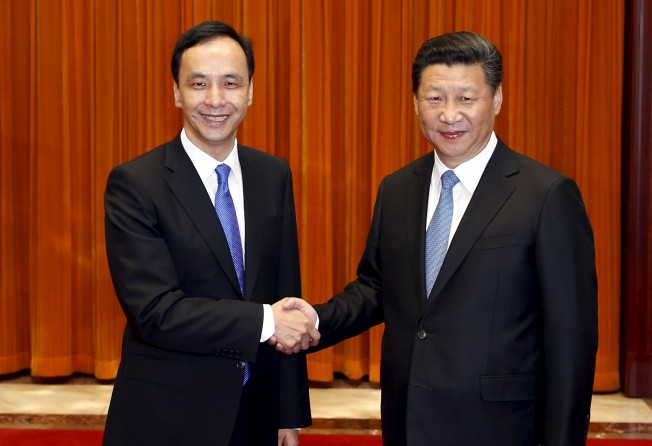Whoever wins Taiwan elections, status quo will rule cross-strait ties

Xi Jinping met Kuomintang chairman Eric Chu Li-luan this week in starkly different circumstances from the last meeting between the ruling party heads of the old political rivals. Then, six years ago, Beijing and Taipei stood on the threshold of a historic thaw in relations after the KMT's return to power in 2008. Now Beijing cannot be confident it will be dealing with the KMT after elections early next year. President Ma Ying-jeou's policy of developing economic ties may have reduced cross-strait tensions that simmered under the pro-independence Democratic Progressive Party's Chen Shui-bian. But heavy KMT losses in recent local government elections reflect voter discontent with economic growth and weak governance. This has resulted in a consensus that the KMT will lose the presidential election, for which DPP chairwoman Dr Tsai Ing-wen has already declared her candidacy. The race certainly appears hers to lose.
While mainland leaders agreed to meet Chu in a bid to shore up support for the KMT, Beijing is also prepared for regime change next year. The terms in which President Xi offered Taiwan more economic benefits, such as arrangements to join regional economic bodies, should therefore be seen also as talking to the DPP. He emphasised that the two sides had to abide by the "one China" principle.
Both Xi and Chu underscored the importance of the "1992 consensus". Speaking as party general secretary, Xi agreed with Chu that the consensus was the basis for continued relations between the two sides. He was quoted as adding: "It is necessary [for the two sides] to seriously think about what way the [next level] of cross-strait relations should go." Xi also called for talks to establish a framework to "systematise" peaceful development of cross-strait ties, which analysts saw as aimed at ensuring relations remain on track whoever leads Taiwan.
The DPP's Tsai has pledged to uphold the basic principle of maintaining the status quo with the mainland, while setting up "normalised" relations beyond the existing framework, which focuses on ties between the KMT and the Chinese Communist Party. Beijing will be watchful for any ambiguity in her future remarks. But it seems unlikely China will find it necessary to make a strong statement ahead of the election reminding Taipei of the one-China principle. Given geopolitical changes and international economic developments, it would be surprising if changing the status quo were a priority for the DPP.